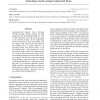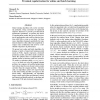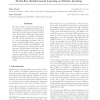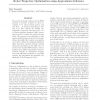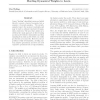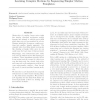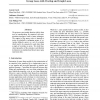ICML
2009
IEEE
15 years 3 months ago
2009
IEEE
Semi-Supervised Support Vector Machines (S3VMs) typically directly estimate the label assignments for the unlabeled instances. This is often inefficient even with recent advances ...
ICML
2009
IEEE
15 years 3 months ago
2009
IEEE
Many learning algorithms rely on the curvature (in particular, strong convexity) of regularized objective functions to provide good theoretical performance guarantees. In practice...
ICML
2009
IEEE
15 years 3 months ago
2009
IEEE
ICML
2009
IEEE
15 years 3 months ago
2009
IEEE
We cast model-free reinforcement learning as the problem of maximizing the likelihood of a probabilistic mixture model via sampling, addressing both the infinite and finite horizo...
ICML
2009
IEEE
15 years 3 months ago
2009
IEEE
We present tight surrogate regret bounds for the class of proper (i.e., Fisher consistent) losses. The bounds generalise the margin-based bounds due to Bartlett et al. (2006). The...
ICML
2009
IEEE
15 years 3 months ago
2009
IEEE
We propose a nonparametric extension to the factor analysis problem using a beta process prior. This beta process factor analysis (BPFA) model allows for a dataset to be decompose...
ICML
2009
IEEE
15 years 3 months ago
2009
IEEE
The general stochastic optimal control (SOC) problem in robotics scenarios is often too complex to be solved exactly and in near real time. A classical approximate solution is to ...
ICML
2009
IEEE
15 years 3 months ago
2009
IEEE
A new "herding" algorithm is proposed which directly converts observed moments into a sequence of pseudo-samples. The pseudosamples respect the moment constraints and ma...
ICML
2009
IEEE
15 years 3 months ago
2009
IEEE
ICML
2009
IEEE
15 years 3 months ago
2009
IEEE
We propose a new penalty function which, when used as regularization for empirical risk minimization procedures, leads to sparse estimators. The support of the sparse vector is ty...
